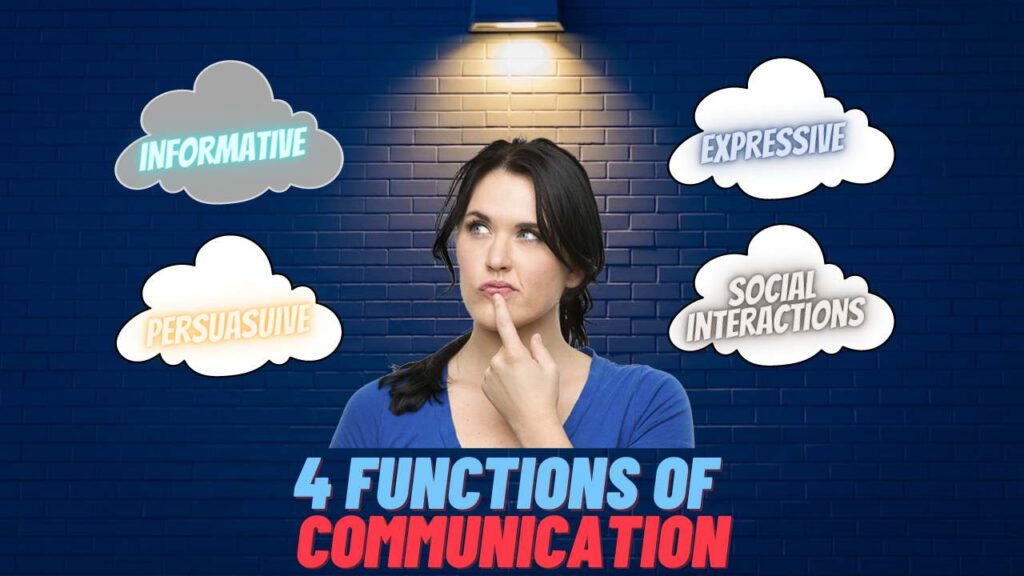Communication serves as the cornerstone of our interactions, both in personal and professional realms. Understanding the 4 major functions of communication is essential for establishing meaningful connections and facilitating effective information exchange. In this article, we will explore the fundamental aspects of these functions and their significance in fostering connection and comprehension.

Informative Communication
Informative communication plays a vital role in sharing knowledge, facts, and data. It involves transmitting valuable information in a clear and concise manner. By effectively utilizing informative communication, individuals, and organizations can convey ideas, instructions, and updates to enhance understanding.
When examining the four functions of communication, informative communication acts as the foundation. It ensures that information is shared accurately, allowing individuals to stay well-informed and make informed decisions. News outlets, for instance, utilize informative communication to provide the public with up-to-date information on global events, advancements, and societal matters.
Expressive Communication
Expressive communication enables individuals to express their thoughts, emotions, and ideas, fostering deeper connections with others. Through verbal and non-verbal means, expressive communication allows us to convey our feelings, attitudes, and perspectives, promoting empathy, understanding, and emotional bonds.
In personal relationships, expressive communication plays a pivotal role. It allows individuals to share love, gratitude, support, and other emotions, nurturing stronger connections. Additionally, within professional environments, effective leaders understand the importance of expressing appreciation, empathy, and encouragement to their team members. By utilizing expressive communication, a positive work environment can be cultivated, resulting in increased job satisfaction and productivity.
Persuasive Communication
Persuasive communication focuses on influencing, convincing, and inspiring others to adopt specific viewpoints or take desired actions. By employing well-structured arguments, compelling narratives, and persuasive techniques, individuals and organizations can shape opinions, drive change, and achieve their objectives.
Marketing and advertising heavily rely on persuasive communication. Marketers skillfully employ persuasive language, captivating visuals, and engaging storytelling to entice consumers and encourage them to purchase products or services. By tapping into consumers’ desires, needs, and aspirations, persuasive communication becomes a powerful tool for brand promotion and sales generation.
Furthermore, persuasive communication extends beyond marketing. It plays a vital role in public speaking, negotiations, and advocacy efforts. With carefully crafted persuasive messages, public opinion can be swayed, policies can be changed, and societal challenges can be addressed.
Social Interaction and Relationship Building
Communication acts as a bridge that connects individuals, fostering social interaction and relationship building. Through conversations, discussions, and dialogue, people form connections, establish rapport, and build meaningful relationships.
Within personal interactions, effective communication facilitates the development of friendships, romantic relationships, and familial bonds. Active listening, empathy, and open-mindedness contribute to successful communication, allowing individuals to understand each other’s perspectives and forge stronger connections.
Within organizations, effective communication plays a vital role in team collaboration and cohesion. By promoting transparency, clarity, and open lines of communication, companies can create a conducive work environment where ideas are freely exchanged, conflicts are resolved, and productivity flourishes.
Conclusion
Understanding the four major functions of communication—informative, expressive, persuasive, and social—empowers individuals and organizations to establish connections, enhance understanding, and achieve their goals. By recognizing the significance of each function and incorporating them into your communication practices, you can unlock the power of effective communication and foster meaningful connections. Remember, successful communication involves more than just the transmission of words—it involves active listening, empathy, and adaptability. By continually honing your communication skills and applying the principles of the four major functions, you can build stronger relationships, influence others positively, and thrive in various personal and professional endeavors.











